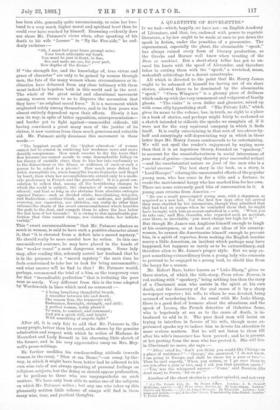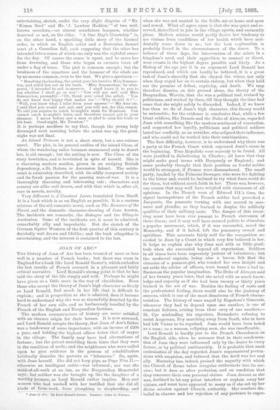A QUARTETTE OF NOVELETTES.* IF we had—which, happily, we have
not—an English Academy of Literature, and that, too, endowed with power to regulate literature, a by-law ought to be made at once to put down the spook in fiction, under the penalties of a preamunire. The supernatural, especially the ghost, the abominable "spook," has always ruined every form of literary production, as the Greeks and Horace well knew when treating of the Deus ex machinci. But a short-story teller has got to un- ravel his knots with the speed of Alexander, and therefore takes to cutting them with the "spook," a wretched, mean, makeshift subterfuge for a decent catastrophe.
All which is directed to the point that Mr. Henry James ought to be ashamed of himself for having out of six short stories, allowed three to be dominated by the abominable "spook." "Owen Wingrave" is a gloomy piece of dullness which ends up with the very commonest and vulgarest of family ghosts. "The visits" is even duller and gloomier, mixed up with some silly hypnotising stuff. "The Private Life," which gives its name to the volume, has, in truth, no right to a place in a book of stories, and perhaps might fairly be reckoned as a sketch intended to ridicule the spooks we complain of, if it were not for the very equivocal company in which it finds itself. It is really entertaining in that sort of too-clever-by- half and annoyingly self-depreciating way in which in these latter days Mr. Henry James condescends to be entertaining. We will not spoil the reader's enjoyment by saying more than that it is an ingenious theory, founded on " spookery," to account for the nnsatisfactoriness in social intercourse of your man of genius—(meaning thereby your successful writer) —and the unsubstantial nature an fond of the man who is a "social success." The best story in the book, as a story, is "Lord Beaupre " relating the unsuccessful efforts of the popular young man, who has come in for a title and a fortune, to evade the matrimonial harpy who has marked him for her own. There are some extremely good bits of conversation in it. A young man returns from America :— "He was a small preoccupied young man, with a sharpness as acquired as a new hat. For the first few days after his arrival they were startled by his intonations, though they admitted that they had had an escape when he reminded them that he might have brought with him an accent embodied in a wife. When you do take one,' said Mrs. Gossehn, who regarded such an accident, over there, as inevitable, you must charge her high for it."
But though Mr. James can Anglicise himself enough to laugh at his countrymen, or at least at our ideas of his country- women, he cannot dis-Americanise himself enough to prevent him, in a spirit of repartee, from making the English heroine marry a little American, an incident which perhaps may have happened, but happens so rarely as to be extraordinary, and therefore alien to Mr. James's proper style. But we may ex- pect something extraordinary from a young lady who consents to pretend to be engaged to a young lord, to shield him from the harpy for a season.
Mr. Robert Barr, better known as "Luke Sharp," gives us three stories, of which the title-story, Prom whose Bourne, is red-reeking with " spookery," being nothing less than the story of a Cincinnati man who assists in the spirit at his own death, and the discovery of the real cause of it by a sharp newspaper reporter ; his wife, to whom he was devoted, being accused of murdering him. As usual with Mr. Luke Sharp, there is a good deal of humour about the situations, and the spook of Lecocq, the French detective of Gaboriau fame, who is hopelessly at sea as to the cause of death, is in- troduced to add to it. The poor dead man will insist on trying to interfere in favour of his wife, though more ex- perienced spooks try to induce him to devote his attention to more serious matters. But he will not listen to them till after his wife's innocence has been proved ; and he is present at her parting from the man who has proved it. She will live in Cincinnati no more, she says :— "'Alice,' cried he, don't you think you would like Chicago as a place of residence P '—' George,' she answered, I do not know. I am going to Europe, and shall be there for a year or two.'— Then he said eagerly. When you return, or I go over there to see you after a year or two, may I ask you that question again P' —‘ Yes,' was the whispered answer.—' Come,' said Brenton (the dead man) to Ferris, riot us go.'" Another of the short stories is a rather spiteful, and not very * (1.) The Private Life, &c. By Henry jates. London : J. R. Osgood. Malvaine, and Co.—(2.) From trh01311 Bourne, &c. By Luke Sharp. London Matto and Windus (3.) An Island Princess. By Theo Gift. London: Law" renoe and Bullen.—(4.) A Constant Lover. Translated by John Niabot. London T. Fisher Unwin. entertaining, sketch, under the very slight disguise of "Mr. Kenai). Buel ' and Mr. 'J. Lawless Hodden," of two well- known novelists,—an almost scandalous lampoon, whether deserved or not, on the elder. "A. One Day's Courtship" is, on the other hand, a sparkling little story of the farcical order, in which an English artist and a Bostonian damsel meet at a Canadian fall, each supposing that the other has intruded into a canoe of which one only was the rightful owner for the day. Of course the canoe is upset, and he saves her from drowning, and those who began as enemies leave off under a flag of truce. The plot is common enough ; but the briskness of the repartees and the humour of the whole are by no means common, even to the last. We give a specimen :— " Reaching the landing, the artist gave his hand to Miss Sommer- ton, and aided her out on the bank. Miss Sommerton,' he whis- pered, I intended to sail to-morrow. I shall leave it to you to say whether I shall go or not.'—' You will not sail,' said Miss Sommerton, promptly.—' Oh, thank you,' cried the artist. You do not know how happy that makes me.'—' Why should it P Well, you know what I infer from your answer.'—' My dear sir, I said that you would not sail, and you will not, for this reason. To sail you require to catch to-night's train for Montreal. You cannot catch to-night's train, and therefore cannot get to your steamer. I never before saw a man so glad to miss his train or his boat. Good-night, Mr. Trenton.'" It is perhaps needless to say that, though the young lady decamped next morning before the artist was up, the good- night was not final.
An Island Princess is not a short story, but a one-volume novel. The plot, in its general outline of the island Circe, of whom the wandering sailor becomes enamoured only to desert her, is old enough ; but the setting is new. The Circe of the story bewitches, and is bewitched in spite of herself. She is a charming modern maiden, grown in an outlying British dependency, a St. Helena or Ascension Island. The settle- ment is admirably described, with its oddly composed society and its frank passion for the passing man-of-war. It is a thoroughly charming and interesting tale ; characters and scenery are alike well drawn, and with that which is, after all, rare in novels, novelty.
Very different is A Constant Lover, translated from Hauff. It is a book which is as un-English as possible. It is a curious mixture of the old romantic novel, such as The Romance of the Forest, and the domestic character-drawing of Jane Austen. The incidents are romantic, the dialogue and the filling-in Austenian. Some of the incidents are, it must be admitted, remarkably silly and improbable. But the sketch of the German Squire Western of the first quarter of this century is decidedly well drawn and lifelike ; and the book altogether is entertaining, and the interest is sustained to the last.



































 Previous page
Previous page